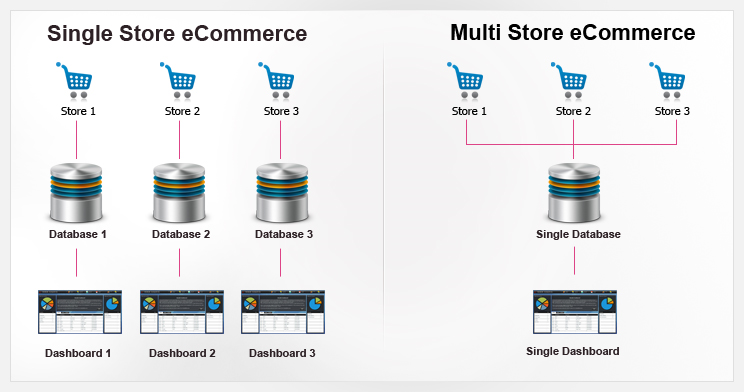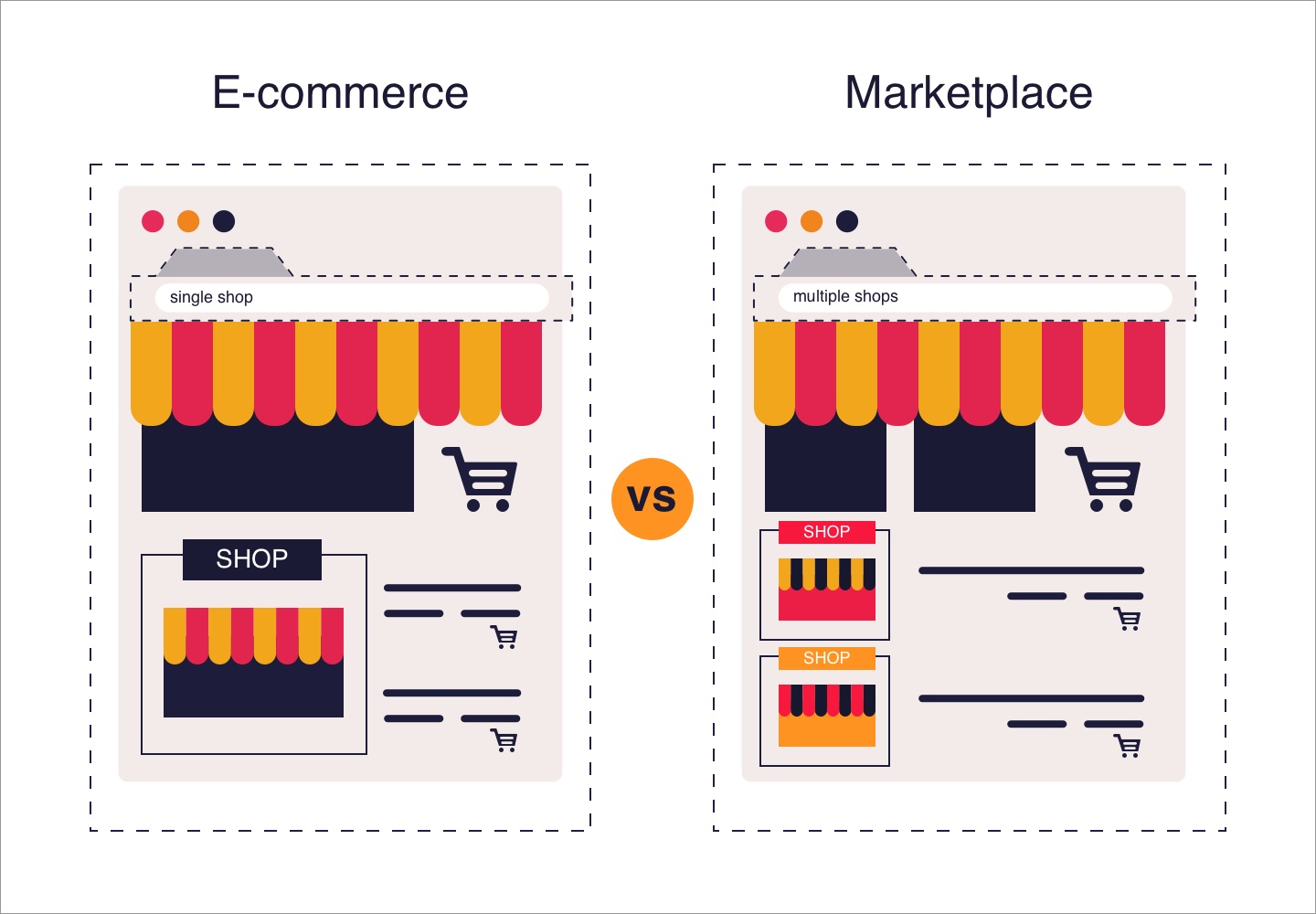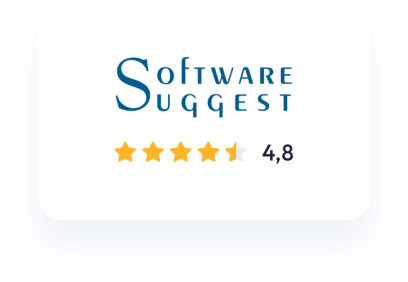
Table of Contents
- I. Introduction
- II. Understanding Multi-Store eCommerce Platforms
- III. Benefits of Multi-Store eCommerce Platforms
- IV. Downsides of Multi-Store eCommerce Platforms
- V. Top 6 Platforms for Building a Multi-Store eCommerce Website
- VI. Distinction Between Multi-Store Online Stores and Marketplaces
- VII. Why CS-Cart Is Perfect for Building a Multi-Store eCommerce Platform
I. Introduction
In the ever-evolving landscape of eCommerce, the paradigm is shifting towards a more dynamic and scalable approach—the multi store eCommerce platform. As businesses strive to broaden their online presence, the traditional single storefront model is giving way to a more versatile and efficient way of managing multiple stores seamlessly.
BigCommerce findings reveal that businesses overseeing multiple eCommerce stores experience an average revenue increase of 38%, showcasing the substantial benefits of adopting this strategy.
In terms of global expansion, Shopify data suggests that 28% of online businesses have intentions to broaden their reach internationally, underscoring the pivotal role of Multi-Store management as a facilitator of global growth.

This article delves into the world of multi store eCommerce platforms, unraveling their significance in the contemporary digital market. We'll explore the benefits that businesses stand to gain compared to conventional single storefront setups, weigh the potential drawbacks, and guide you through selecting the right multi store eCommerce platform for your multi store ecommerce ambitions.
Join us on this insightful journey as we navigate through the complexities and opportunities presented by multi store eCommerce platforms. By the end, you'll have a comprehensive understanding of why embracing this approach could be a game-changer for your online business and which platforms stand out in this competitive landscape. Let's explore the future of eCommerce together.
II. Understanding Multi-Store eCommerce Platforms
Imagine you have a favorite local bakery that decides to expand and open not just one, but several branches across different neighborhoods. Each branch caters to the tastes and preferences of the specific community it serves. That's a bit like what a multi store ecommerce platform does for online businesses.
In the digital world, a multi store ecommerce platform is like having multiple online stores, each catering to a specific audience or selling a particular type of product. Just like your favorite bakery adapts to different neighborhoods, a multi-store platform allows businesses to customize their online multiple storefronts based on factors like location, types of products, or even different brands they want to showcase.
For instance, if you're an online clothing store, you could have one storefront focusing on casual wear, another on formal attire, and maybe even a specialized one for sportswear. Each storefront operates independently, yet they all share a common management system. It's like managing multiple stores under one roof, making it easier to control everything from product information to marketing strategies.
This way, businesses can reach a wider audience, adapt to different market demands, and organize their products more efficiently. The multi store ecommerce platform essentially becomes the backbone that helps businesses grow and thrive in the vast digital marketplace.

III. Benefits of Multi-Store eCommerce Platforms
In the ever-evolving world of eCommerce, the adoption of multi-store platforms brings forth a myriad of advantages for businesses seeking to expand their online presence. Let's explore these benefits in simple terms, drawing insights from real-life examples.
1. Enhanced Scalability for Growing Businesses
Imagine you're running a small online boutique selling handmade jewelry. As your business gains traction, you decide to tap into different markets by introducing a separate store for customized accessories. A multi store eCommerce platform allows you to seamlessly manage multiple eCommerce stores from a single dashboard. This scalability empowers your business to grow without the constraints of a singular online space.
2. Improved Customer Targeting and Segmentation
Consider a fashion retailer catering to a diverse audience with varying preferences. With a multi-store setup, you can create separate stores for different demographics. For instance, one store could focus on trendy urban fashion, while another targets a more classic aesthetic. This targeted approach ensures that each customer finds what they're looking for, leading to increased satisfaction and loyalty.
3. Centralized Management for Efficient Operations
Think of a multi store eCommerce platform as the control center for your online empire. Instead of juggling multiple systems and logins, you can efficiently manage multiple stores - inventory, orders, and customer data from a single dashboard. This not only streamlines day-to-day operations but also minimizes the risk of errors that may arise when handling separate stores independently.
4. Cost-Effectiveness Compared to Managing Multiple Single Storefronts
Consider the expenses associated with maintaining separate stores, each with its own hosting, maintenance, and support costs. Now, envision a scenario where you can achieve the same level of diversity and reach through a single platform. A multi store eCommerce solution eliminates the need for redundant expenditures, offering a cost-effective multi store ecommerce solution for businesses aiming to broaden their online footprint.
In essence, the benefits of the best multi store eCommerce platform are akin to having multiple storefronts of a physical store, each tailored to meet the unique needs of its customer base. This strategic approach not only facilitates growth but also enhances overall business agility and efficiency.
IV. Downsides of Multi-Store eCommerce Platforms
Despite the numerous benefits, diving into the world of multi store eCommerce platforms comes with its own set of challenges. Let's break down these downsides in simpler terms, using real-world examples.
1. Complexity in Initial Setup and Configuration
Imagine you're opening multiple physical stores across different cities. Each store needs careful planning and setup to reflect your brand consistently. Similarly, in the digital realm, configuring multiple storefronts on an eCommerce platform requires time and effort to ensure everything runs smoothly from the get-go.
2. Potential Challenges in Maintaining Consistency Across Multiple Stores
Think of your online stores as branches of a retail chain. Just as you'd want a consistent experience in each physical store, maintaining a unified look and feel across all your stores is crucial online. Differences in product details or pricing could confuse customers, impacting your brand's overall image.
3. Resource and Time Requirements for Effective Management
Managing several online shops is like overseeing several shops in a mall. It requires personnel and time to keep each one running smoothly. Businesses need to allocate enough resources to manage and update each store individually, avoiding the risk of neglecting any particular storefront.
4. More Spending on Marketing
Expanding to multiple storefronts means reaching different customer groups. This diversity is a plus, but it also means spreading your marketing efforts across various channels. Picture having different billboards for each physical store. While it increases visibility, it also requires more spending on tailored marketing campaigns for each ecommerce business.
Understanding these downsides is like knowing the challenges of running several physical stores. With careful planning and attention, businesses can address these hurdles, ensuring a successful and coherent operation across multiple brands and ecommerce websites.
V. Top 6 Platforms for Building a Multi-Store eCommerce Website
When it comes to choosing the right platform for your multi store eCommerce business, various options cater to different business needs. Let's review six prominent platforms and their key features:
1. CS-Cart:
CS-Cart stands out with its inherent multi-store functionality, allowing you to effortlessly create an unlimited number of multiple storefronts on different domains and manage them in a single admin panel. This platform offers versatility by accommodating storefronts for B2B and B2C simultaneously, catering to different regions, niches, and more. Notably, CS-Cart goes beyond traditional shopping carts, providing a marketplace platform with multi-store functionality, allowing you to assign vendors to specific storefronts.
2. WooCommerce:
WooCommerce operates as an open-source solution seamlessly integrated with WordPress. It enables the creation of multiple stores using WordPress Multisite or third-party plugins. Ideal for small businesses seeking a cost-effective solution, WooCommerce supports independent catalogs for each store. Its flexibility extends to internationalization support, flexible shipping and tax configuration, and an extensive ecosystem of themes and plugins.
3. Shopify Plus:
Shopify Plus is a user-friendly solution for eCommerce businesses needing scalability and ease of use. It supports up to nine free stores in addition to the main store, making it convenient for managing multiple sites without concerns about hosting and security. Offering multiple shopify stores under a single brand, Shopify Plus is an excellent choice for direct-to-consumer (DTC) brands seeking scalability.
4. OpenCart:
OpenCart is an open-source platform offering centralized dashboard management for multiple stores. It allows the creation of separate storefronts for different brands or product lines, each with a unique design. OpenCart is suitable for small businesses and DTC brands, providing a lightweight ecommerce platform with features like multilingual and multi-currency support.
5. Adobe Commerce (Magento):
As an open-source platform, Magento supports multiple websites and store views by default. It's scalable and customizable, making it suitable for businesses of varying sizes with extensive catalogs and advanced customization needs. With features like multi-source inventory management, multi-currency support, and powerful marketing tools, Magento provides a fast and responsive shopping experience.
6. BigCommerce:
BigCommerce simplifies the process of running multiple online shops with its user-friendly interface. Its robust and scalable hosting infrastructure allows easy creation of separate stores for different product categories, brands, or regions. Ideal for omnichannel B2B and B2C businesses, BigCommerce provides unified store management, open API architecture, and customizable pricing support.
Selecting the right platform depends on your business requirements, whether you prioritize inherent multi-store capabilities, seamless integration with WordPress, advanced customization, scalability, or user-friendly interfaces. Each of these multi store eCommerce platforms has its unique strengths, catering to a variety of multi store ecommerce needs, including ecommerce features, customer data, and inventory management across multiple brands and customer groups through a centralized database.

CS-Cart Marketplace
VI. Distinction Between Multi-Store Online Stores and Marketplaces
In the dynamic landscape of eCommerce, two prominent models for expanding your online presence are multi-store online shops and marketplaces. Understanding the distinctions between these models is crucial for making informed decisions about your business strategy.
Multi-Store Online Stores:
A multi-store online store refers to the model where a single business operates multiple stores, each catering to specific demographics, regions, or product categories. This approach provides businesses with the flexibility to tailor the shopping experience for diverse customer groups. For example, a fashion retailer might have different stores for casual wear, formal attire, or athletic gear.
Use Cases:
- Tailoring shopping experiences for different customer segments.
- Managing product catalogs and promotions independently for each store.
- Offering specialized branding and messaging for each storefront.
Marketplaces:
Marketplaces, on the other hand, involve a platform where multiple third-party vendors or sellers can list and sell their products. The marketplace owner facilitates transactions and provides a centralized platform for buyers and sellers to connect. Well-known examples include Amazon, eBay, or Etsy. Marketplaces are characterized by a broad product range from various sellers within a single platform.
Use Cases:
- Allowing third-party vendors to reach a wider audience.
- Providing a diverse product range without managing individual storefronts.
- Offering a centralized shopping destination for customers.
Multi-Vendor Platforms:
It's essential to note the emergence of multi-vendor platforms that seamlessly blend the advantages of both models. Multi store eCommerce platforms like CS-Cart provide a multi-vendor solution with built-in multi-store functionality. In a CS-Cart-based marketplace, you can create an unlimited number of storefronts for different vendor groups. This approach empowers businesses to leverage the benefits of a centralized platform while allowing vendors to manage their storefronts independently.
Use Cases:
- Enabling multiple vendors to operate individual storefronts within a unified marketplace.
- Offering a wide range of products from various vendors without the complexity of managing separate stores.
- Facilitating vendor relationships and fostering collaboration in a shared marketplace.
When to Choose One Over the Other:
Business Control:
- Multi-Store Online Stores: Ideal when you want complete control over each storefront's branding, customer experience, and product offerings.
- Marketplaces/Multi-Vendor Platforms: Suitable when you prefer a platform that facilitates transactions and a wide product range without managing individual stores.
Product Range:
- Multi-Store Online Stores: Beneficial when your products cater to different niches or demographics, and you want to maintain distinct branding for each.
- Marketplaces/Multi-Vendor Platforms: Effective for businesses that want to offer a vast range of products without the need to manage multiple storefronts.
Vendor Relationships:
- Multi-Store Online Stores: Appropriate when you want direct relationships with vendors and complete control over your product range.
- Marketplaces/Multi-Vendor Platforms: Useful when you want to leverage third-party vendors to expand your product offerings without the need for direct management.

Online marketplace vs. online shop. Source: AsperBrothers
In conclusion, the choice between a multi-store online store, a marketplace, or a multi-vendor platform depends on your eCommerce business goals, the level of control you desire, and the nature of your products. Each model offers unique advantages, and understanding their distinctions empowers you to adopt a strategy that aligns with your business objectives. From managing multiple channels and enhancing customer experience to executing effective marketing strategies, the right platform allows you to navigate the complexities of eCommerce seamlessly, all within a single database.
VII. Why CS-Cart Is Perfect for Building a Multi-Store eCommerce Platform
When it comes to choosing the right eCommerce software for building a multi store eCommerce solution or a marketplace, CS-Cart stands out as a leading solution. With over 16 years of expertise since its inception in 2005, CS-Cart has been instrumental in helping businesses enhance their online presence, create robust online shops, and establish successful marketplaces.
Key CS-Cart Advantages:
- Proven Track Record: CS-Cart boasts a rich history of supporting businesses since 2005, accumulating invaluable experience in the eCommerce landscape.
- User Trust: Backed by over 300 real user reviews with an impressive average score of 4.7 out of 5, CS-Cart has earned the trust and satisfaction of its user community.
- Global Adoption: Over 50,000 online shops and marketplaces worldwide have been built with CS-Cart, showcasing its widespread adoption and effectiveness.
- Flexibility for Every Business: CS-Cart offers a flexible product line that caters to various eCommerce business goals, sizes, and scenarios. Whether you're a small business or an enterprise, CS-Cart adapts to your unique needs.
- Open Code for Unlimited Modifications: One of CS-Cart's strengths lies in its open code architecture, providing users with the freedom for unlimited modifications and customization according to their specific requirements.
- Scalability: CS-Cart ensures scalability, allowing your eCommerce platform to grow seamlessly as your business expands. Whether you're starting small or have large-scale ambitions, CS-Cart is equipped to meet your evolving needs.
- Enterprise Headless Platform: For advanced users seeking an enterprise-grade platform, CS-Cart offers a large scale enterprise solutions based on Laravel. This empowers businesses with even greater flexibility and customization capabilities.
Experience the CS-Cart Difference: Explore the power of CS-Cart by trying the demo for free. Discover firsthand how CS-Cart's features, flexibility, and user-friendly interface can elevate your eCommerce experience.




